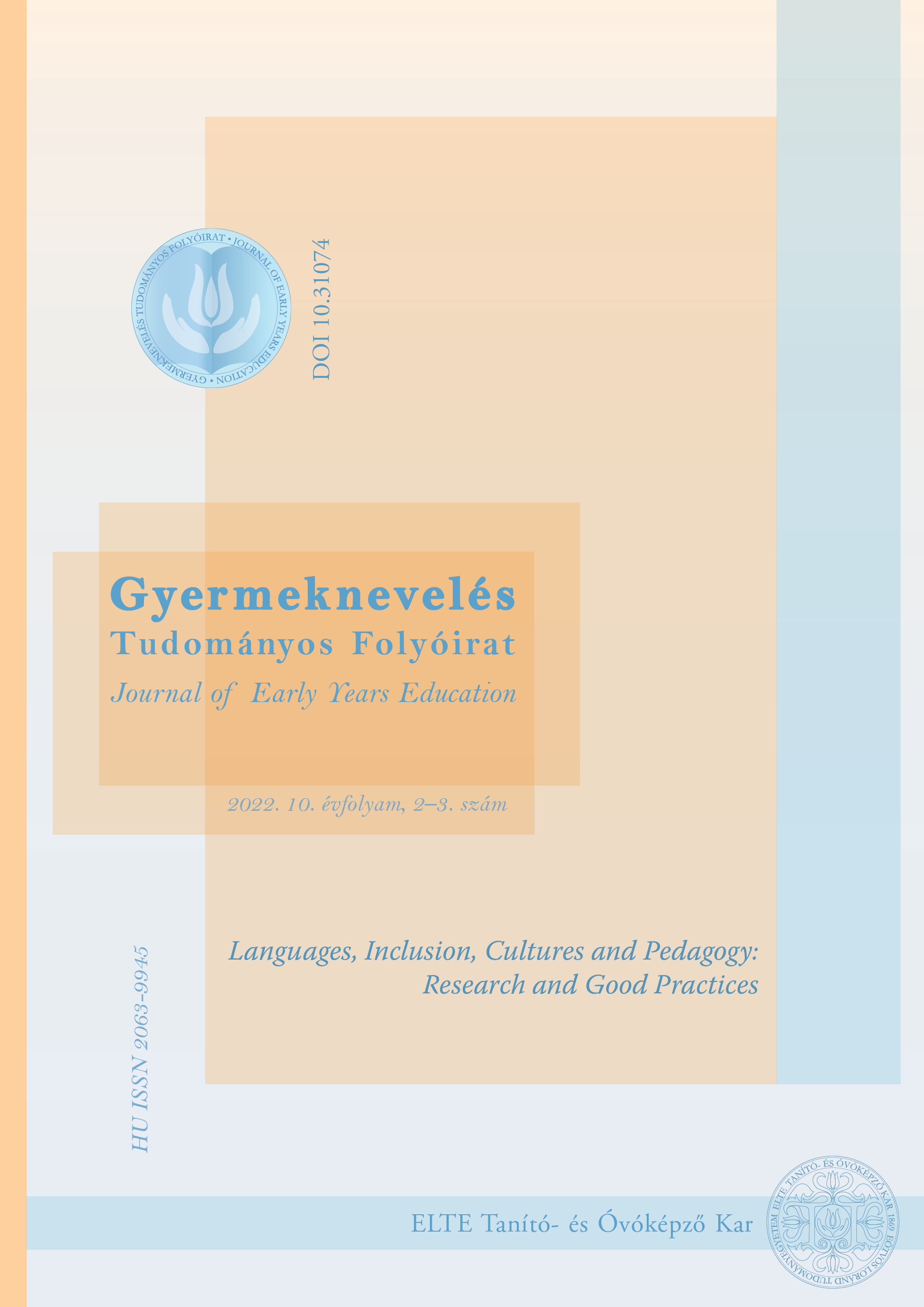Locating the position of non-formal learning: theory and practice
DOI:
https://doi.org/10.31074/gyntf.2022.2.47.62Keywords:
non-formal learning, reflection, learning preferences, case study, higher educationAbstract
Our article argues that, while learning continuously surrounds us, being aware of its importance is not necessarily possible through formal learning opportunities alone. By briefly introducing the concept and main principles of non-formal learning, we illustrate how reflection, a key process of learning, can be effectively involved in the design and implementation of educational practices. By means of a case study investigating a project that aims to develop university students’ intercultural competences, we show how the principles of non-formal learning can be included in formal, higher educational settings and how this approach and methodology can be fruitful in developing personal, social, and cultural competences. The case study also refers to the reflective competence of the facilitators of the project and how they have developed the content through their own learning processes and feedback from the participants.
Downloads
References
Argyropoulos, A. & Kanari, C. (2019). The Role of Non-formal Learning Environments in Education and Socialization of Children with Visual Disability: The Case of Museums. In Halder, S. & Argyropoulos, V. (Eds.), Inclusion, Equity and Access for Individuals with Disabilities (pp. 125–151). Palgrave Macmillan. https://doi.org/10.1007/978-981-13-5962-0_7
Batsleer, J. (2008). Informal Learning in Youth Work. SAGE. https://doi.org/10.4135/9781446216088
Beard, C. & Wilson, J. P. (2018). Experiential Learning: A Practical Guide for Training, Coaching and Education. 4th ed. Kogan Page Publishers.
Brookfield, S. D. (1998). Critically Reflective Practice. Journal of Continuing Education in the Health Professions, 18(4), 197–205. https://doi.org/10.1002/chp.1340180402
Carroll, M. (2010). Levels of reflection: On learning reflection. Psychotherapy in Australia, 16(2), 24–31.
Chisholm, L. (2005). Recognising non-formal & informal learning in the youth sector. Terminology Cheat Sheet. Bridges for Recognition (pp. 41–49). SALTO-YOUTH Inclusion Resource Centre. https://www.salto-youth.net/downloads/4-17-630/BridgesForRecognition.pdf
Council of Europe (2017). Recommendation CM/Rec(2017)4 of the Committee of Ministers to member States on youth work. https://rm.coe.int/1680717e78
Dunne, A., Ulicna, D., Murphy, I. & Golubeva, M. (2014). Working with young people: the value of youth work in the European Union. European Commission. https://ec.europa.eu/assets/eac/youth/library/study/youth-work-report_en.pdf
Dutsinma, L. I. F. & Temdee, P. (2020). VARK Learning Style Classifcation Using Decision Tree with Physiological Signals. Wireless Personal Communications, 115(4), 2875-2896. https://doi.org/10.1007/s11277-020-07196-3
European Commission (2010). “Resolution of the Council and of the Representatives of the Governments of the Member States, meeting within the Council, on youth work.” Official Journal of the European Union, 53, 1–5.
European Council (2018). Council Recommendation of 22 May 2018 on key competences for lifelong learning. Official Journal of the European Union, 61, C 189/1-C 189/13.
European Parliament and the Council (2013). Regulation No 1288/2013 Of The European Parliament And of The Council of 11 December 2013 establishing ‘Erasmus+’: the Union programme for education, training, youth and sport and repealing Decisions No 1719/2006/EC, No 1720/2006/EC and No 1298/2008/EC. Official Journal of the European Union, 50–73. https://eur-lex.europa.eu/legal-content/EN/TXT/?uri=CELEX%3A32013R1288&qid=1395671967554
Fleming, N. D. (2012). Facts, Fallacies and Myths: VARK and Learning Preferences. https://vark-learn.com/wp-content/uploads/2014/08/Some-Facts-About-VARK.pdf
Fleming, N, & Blaume, D. (2006). Learning Styles Again: VARKing up the right tree. Educational Developments, 7, 4–7. https://doi.org/10.1016/S1471-0846(06)70627-8
Goodall, H. (2015). Professional development and beyond: a participative study of a self-facilitated learning group. Plymouth University. A thesis submitted to Plymouth University in partial fulfilment for the degree of professional doctorate in education (EdD). https://pearl.plymouth.ac.uk/handle/10026.1/3428
Hedin, N. (2010). Experiential Learning: Theory and Challenges. Christian Education Journal, 7(1), 107–117. https://doi.org/10.1177/073989131000700108
Kielak, E., Kimmig, M. & Szlęk, A. (2018). Między Innymi – Among Others: Bringing Intercultural and Non-Formal Education to Higher Education Institutions. https://epale.ec.europa.eu/ https://epale.ec.europa.eu/en/blog/miedzy-innymi-among-others-bringing-intercultural-and-non-formal-education-higher-education
Klocker, S. (2009). Manual for facilitators in non-formal education. Council of Europe Publishing.
Kloosterman, P. (2014). Learning to learn in practice in non-formal education. In Crick, R. D., Stringher, C. & Ren, K. (Eds.), Learning to Learn: International perspectives from theory and practice (pp. 271–288). Routledge. https://doi.org/10.4324/9780203078044-13
Kloosterman, P. & Taylor, M. E. (2012). Handbook for facilitators – learning to learn in practice. Firidas.
Kolb, D. A. (2014). Experiential Learning: Experience as the Source of Learning and Development. 2nd ed. Pearson.
Kolb, D. A. & Fry, R. E. (1975). Towards an Applied Theory Of Experiential Learning. In Cooper, C. L. (Ed.), Theories of Group Processes. Wiley Series On Individuals, Groups, and Organizations. Wiley.
Mikelatou, A. & Arvanitis, E. (2018). Social inclusion and active citizenship under the prism of neoliberalism: A critical analysis of the European Union’s discourse of lifelong learning. Educational Philosophy and Theory, 50(5), 499–509. https://doi.org/10.1080/00131857.2017.1382348
Norqvist, L. & Leffler, E. (2017). Learning in non-formal education: Is it ‘‘youthful’’ for youth in action? International Review of Education, 63, 235–256. https://doi.org/10.1007/s11159-017-9631-8
Pearce, P. L. & Foster, F. (2007). A ‘‘University of Travel’’: Backpacker learning. Tourism Management, 28, 1285–1298. https://doi.org/10.1016/j.tourman.2006.11.009
Ravenscroft, A. (2020). Participatory internet radio (RadioActive101) as a social innovation and co-production methodology for engagement and non-formal learning amongst socially excluded young people. International Journal of Inclusive Education, 26(6), 541-558. https://doi.org/10.1080/13603116.2019.1700312
Robertson, L., Smellie, T., Wilson, P. & Cox, L. (2011). Learning styles and fieldwork education: Students’ perspectives. New Zealand Journal of Occupational Therapy, 58(1), 36–40. https://vark-learn.com/wp-content/uploads/2014/08/Learning_styles_and_fieldwork_education_students_perspectives.pdf
Schinske, J. & Tanner, K. (2014). Teaching More by Grading Less (or Differently). CBE—Life Sciences Education, 13, 159–166. https://doi.org/10.1187/cbe.cbe-14-03-0054
Schön, D. A. (1983). The Reflective Practitioner: How Professionals Think in Action. Basic Books.
Straka, G. A. (2002). Valuing learning outcomes acquired in non-formal settings. In Nijhof, W. J., Heikkinen, A. & Nieuwenhuis, L., F. M. (Eds), Shaping Flexibility in Vocational Education and Training (pp. 149–166). . Kluwer Academic Publishers. https://doi.org/10.1007/0-306-48157-X_10
Titley, G. (2002, Ed.). T-Kit on Training Essentials. Council of Europe publishing.
Volles, N. (2016). Lifelong learning in the EU: changing conceptualisations, actors, and policies. Studies in Higher Education, 41(2), 343–363. https://doi.org/10.1080/03075079.2014.927852
Zentner, M. & Ord, J. (2018). European Youth Work Policy Context. In Ord, J., Carletti, M., Cooper, S., Dansac, C., Morciano, D., Siurala, L. & Taru, M. (Eds.), The Impact of Youth Work in Europe: A Study of Five European Countries (pp. 17–31). Humak University of Applied Sciences. https://www.humak.fi/wp-content/uploads/2018/09/The-Impact-Of-Youth-Work.pdf
Additional Files
Published
How to Cite
Issue
Section
License
Copyright (c) 2022 Author

This work is licensed under a Creative Commons Attribution-NonCommercial-ShareAlike 4.0 International License.

